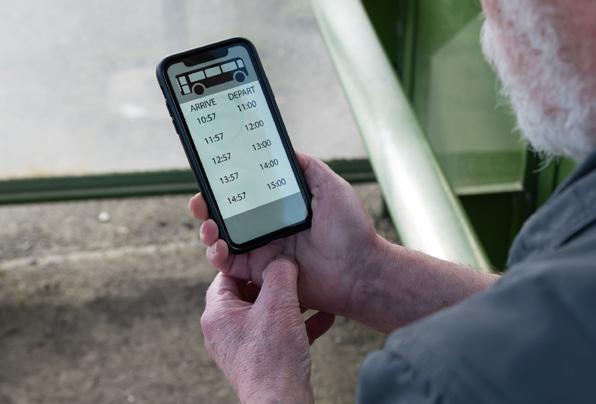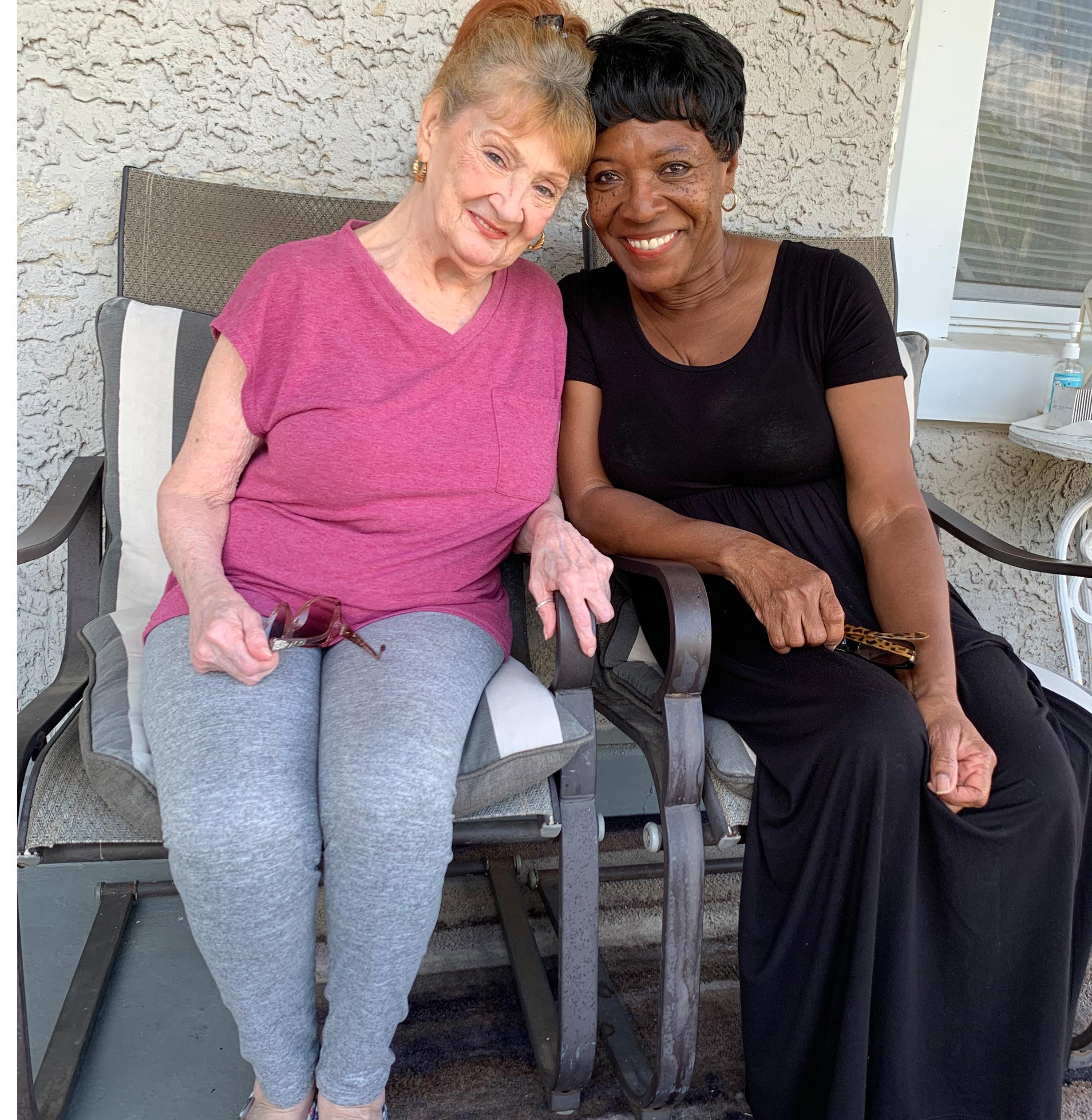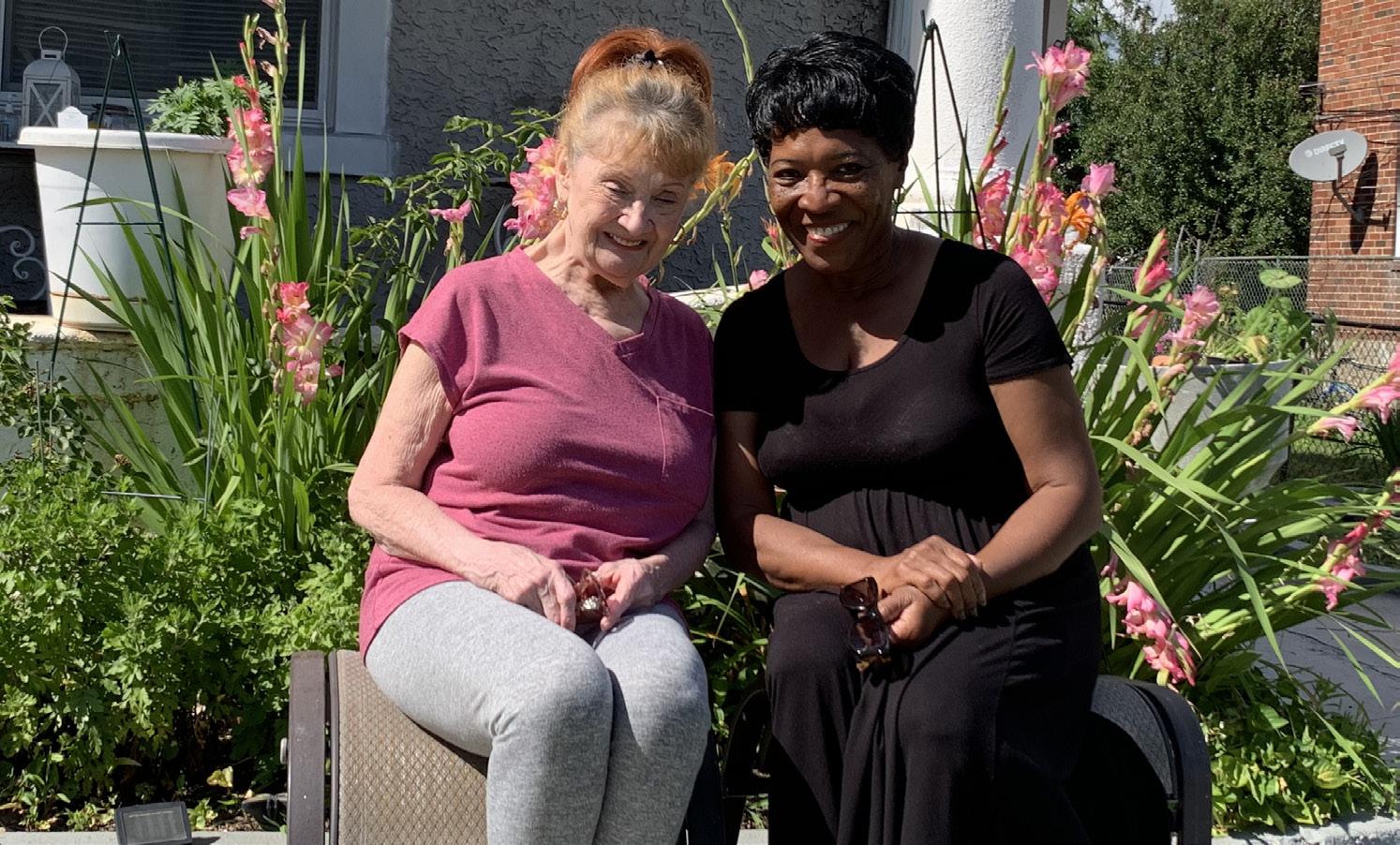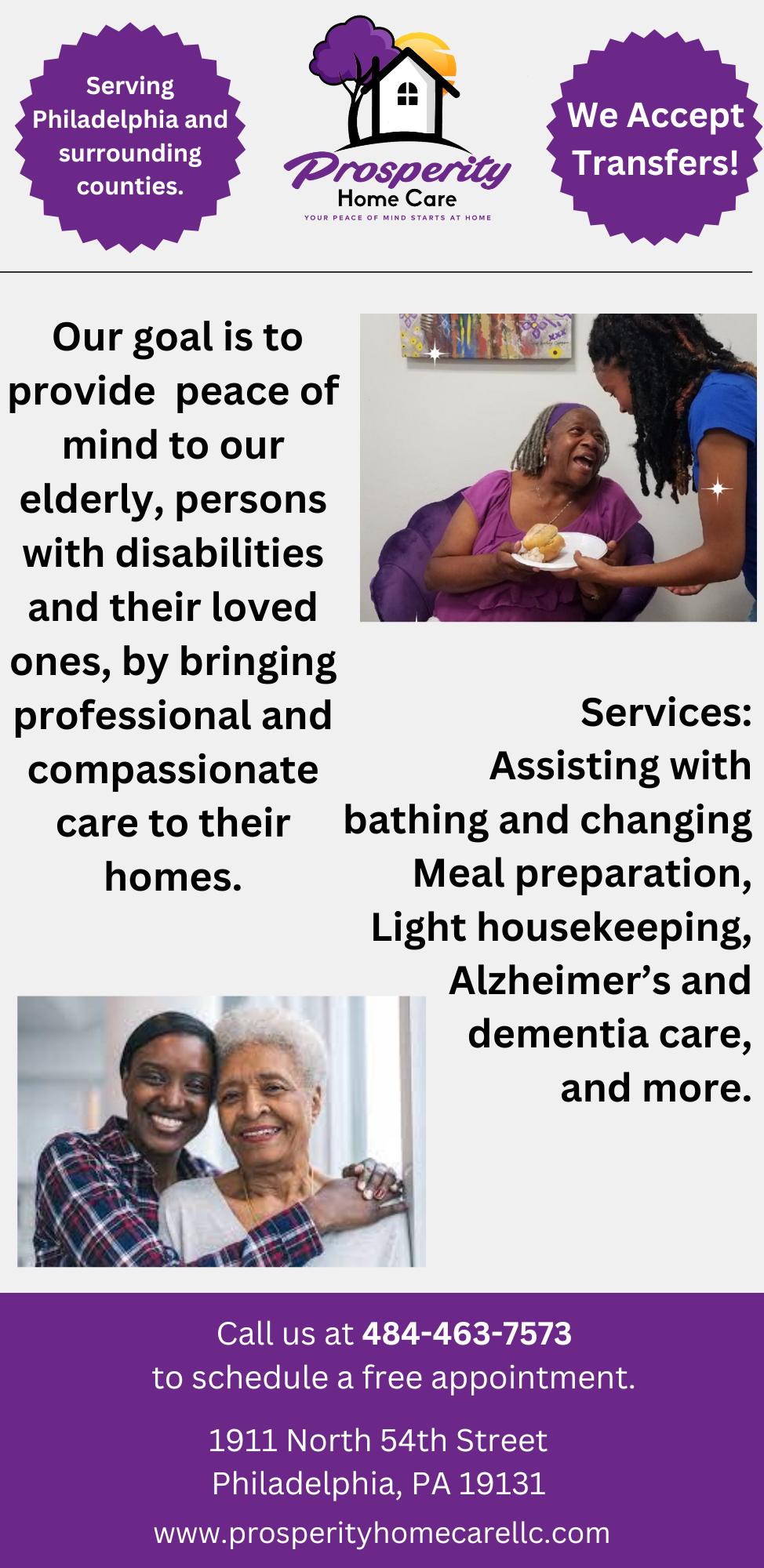








Philadelphia Corporation for Aging (PCA) is the Area Agency on Aging for Philadelphia County and is dedicated to serving Philadelphia’s older adults and adults with disabilities.
PCA publishes Milestones and offers:
• Care in the home
• Home-delivered meals
• Home repairs and modifications
• Protective services
• Senior centers
• Caregiver support
• Veteran-directed care
• Employment and volunteer programs
• Legal services
• Transportation
• Ombudsman services
• Health education
• Information and referral

Report suspected elder abuse 24/7 to the PCA Helpline: 215-765-9040 or pcaCares.org.
Published by Philadelphia Corporation for Aging
Najja R. Orr, DBA, FCPP President and CEO
PCA Board of Directors 2024
Glenn D. Bryan, Chair
Louis G. Colbert, Vice Chair
Eloise Young, Treasurer
Lynn Fields Harris, Secretary
Satya B. Verma, O.D., Immediate Past Chair
Denise Adamucci
Louis A. Bove, Esq.
Wilmarie Gonzalez
Sandra McNally
Paul Nathanson
Norma D. Thomas, D.S.W.
John Whitman
Jacqueline S. Zinn, Ph.D.
Emeritus: Arthur E. Helfand, D.P.M.
Milestones is published monthly and distributed at more than 1,100 locations throughout Philadelphia.
Check us out online: pcaCares.org/ Milestones
Editor: Alicia M. Colombo 215-765-9000, ext. 5081 PCA, 642 N. Broad St. Philadelphia, PA 19130
Email: MilestonesNews@pcaCares. org
Advertising: Teresa Heavens 215-765-9000, ext. 5053
Email: Teresa.Heavens@pcaCares. org
Subscriptions & Distributions: Home delivery: $12/year
The views expressed in Milestones are not necessarily those of Philadelphia Corporation for Aging (PCA). Milestones will not knowingly accept or publish fraudulent or misleading advertising. Milestones reserves the right to edit, revise or reject ads. Milestones assumes no responsibility for errors, misprints, omissions or misinformation; for failure to publish an ad; or for any damages of any kind. Neither the publisher nor any other party is rendering expert advice in this publication. No part of this newspaper may be reproduced without the permission of PCA. ©2024 Philadelphia Corporation for Aging. All rights reserved.

By Najja R. Orr, DBA, FCPP PCA President & CEO
At Philadelphia Corporation for Aging (PCA), we help older adults stay connected to the community and remain safely in their homes. We are steadfast about protecting older adults, advocating for their rights and benefits, and serving people with the greatest social and economic needs.
Building upon an incredible 50-year legacy of service to older Philadelphians and adults with disabilities, PCA is focused on planning to meet the future needs of this diverse older adult population.
In my 25 years of working in aging services, there has been a steep, steady increase in the total number of older adults, as well as in the number of people who are living longer and require additional services to maintain their maximum independence in the community. At the same time, organizations that have social missions are struggling to find the resources and funding to keep pace with the growing needs of the individuals they serve.
At PCA, there is a focus on prioritizing programs that improve outcomes for older Philadelphians. We are continually
re-evaluating how to strengthen these programs and make sure that the limited resources go to the right places.
To help guide our work in the future, PCA recently released its State of the Agency Report for fiscal year 2024-25 and drafted its four-year Area Plan for Aging Services (2024-2028). PCA’s key topic areas and new priorities for the next four years will be:
• Continue to target the Older Americans Act core programs to those in greatest economic and social need to support aging in place and decrease the risk of institutionalization.
• Maintain relationships and improve services based on lessons learned during the COVID-19 pandemic.
• Continue to address equity issues impacting consumer’s social determinants of health and access to resources, with special attention to those experiencing the greatest social and economic needs.
• Explore innovative techniques to expand access to home- and community-based services.
• Strengthen caregiver services.
PCA has a tremendous history and deep roots in the community. Now, we are looking at ways to better support older adults. Over the next few years, the field of aging services will embrace technology more. This includes innovating to utilize resources wisely, while finding ways to serve more people. We are looking for ways to streamline the work we do to make it more effective and efficient, so we can serve you better.
To read PCA’s State of the Agency Report, go to pcaCares.org/resources/ publications.


Beyond meeting basic needs, the program encourages social engagement and fosters a sense of community. Participants are supported in pursuing hobbies, attending social events, and maintaining connections with family and friends. This comprehensive approach helps reduce feelings of isolation and depression, which are common among individuals living in long-term care settings.
Do you have an extra room in your home and space in your heart? PCA aims to expand its Dom Care Program to reach more individuals in need. This includes increasing the number of trained providers and raising awareness about the program’s benefits.
By Bill Conallen
A special program in Philadelphia offers an essential alternative to institutional living for adults, age 18 or older, who require assistance to live independently.
Philadelphia Corporation for Aging’s (PCA’s) Domiciliary Care (Dom Care) Program offers adult participants access to reside in private homes with dedicated home care providers who are willing to create a supportive environment. The program ensures personalized care for participants, including medication supervision, housekeeping and assistance with budgeting, and fosters a sense of family that is often lacking in traditional care facilities. Each participant’s needs are meticulously assessed to create a customized care plan that promotes independence, while ensuring safety and well-being.
PCA matches certified home providers with those in need of a caring, supportive home. Dom Care
residents are unable to live independently, due to physical, emotional or cognitive challenges, but they do not need special aroundthe-clock attention. Providers are people in the community who want to open their homes to provide care for up to two residents.
“For many individuals, Domiciliary Care evolves into much more than just a temporary solution; it becomes a long-term home and an extended family,” said Shani Gilmore, PCA’s executive administrator of long-term care. “I have witnessed, firsthand, how Dom Care has profoundly impacted the lives of our consumers. This program provides not only a safe and stable living environment but also a sense of belonging and community that many have never experienced before. Without the support and structure offered by Dom Care, some individuals would be facing homelessness, or even worse circumstances, struggling to survive without basic necessities and care.”
Many participants view their Dom Care placements not just as housing, but as a true home where they can form meaningful relationships and receive the emotional support they need. Home providers often become like family members, providing companionship, care and a sense of stability that many participants have lacked in their lives.
The program also has a profound impact on the Philadelphia community by providing an alternative to nursing homes and other institutional settings. It alleviates pressure on the health care system and allows participants to age with dignity in a home-like environment.
“Older adults deserve to feel empowered in the knowledge that they can maintain enriched lives that keep them connected to the community they have come to call home,” said Cheryl Clark-Woods, director of the Caregiver Support Program at PCA. “In the process, countless Philadelphians have embraced newfound connections they may not have otherwise been able to experience.”
Prospective home providers must complete a certification process to assure the homes meet fire, health and safety regulations. Providers must also have criminal history clearances; satisfactory financial, medical and personal references; attend ongoing training sessions; and work as a team member with care managers and consumers.
Once certified, PCA care managers match individuals and home providers according to their preferences and work closely with all parties involved to ensure that the match remains mutually beneficial.
Consumer eligibility for participation in the Dom Care Program is determined by a thorough assessment, completed by PCA’s Long Term Care Access department. Eligible participants must receive Social Security or disability benefits, or be able to pay a private monthly fee to their provider.
To learn more about Dom Care or to start the enrollment process, call the PCA Helpline at 215765-9040 or visit our website at pcaCares.org/DomCare.

By Jay Nachman
While headaches can occur in people of any age, they usually start earlier in life. However, doctors don’t know what causes headaches, according to Dr. Michael J. Marmura, the director of outpatient operations at the Jefferson Headache Center and co-chief of the Division of Headache. Headache disorders, like migraines, usually run in families, but there are many other factors in the environment that aren’t fully understood. In some cases, like with caffeine withdrawal, there is a clear
Mayo Clinic Health System offers the following tips to help lessen headache intensity or frequency. As a bonus, these tips also help other health conditions, including heart disease, depression, Type 2 diabetes and high blood pressure.
Talk with your primary care provider if your headaches occur a few times per week, are debilitating, last more than one day, or interfere with your daily activities.
This natural stress reliever also releases feel-good endorphins that
cause for a headache. But in most cases, there’s no obvious reason for headache to start.
If someone has an occasional tension headache, or even a severe headache, and it can be eased with over-the-counter medication, there is no need to see a doctor. However, if someone age 50 or older is having constant life-disrupting headaches, that person should see a doctor.
“When we see someone who is over 50 with a new onset of a headache, we’re more suspicious to make sure that there is not some other cause that we’re missing,” Marmura said. “We make sure to investigate for other causes which can include high blood pressure, neck problems, and headaches after a trauma or stroke.”
A severe headache episode is known as a migraine. Most people with migraines have at least moderate or severe pain, which is often throbbing or pulsing. There can also
block pain signals to the brain. Aim for 30 minutes of moderate exercise at least five days a week or 150 total minutes per week for the full benefit.
Some over-the-counter headache medications include caffeine, and a small amount can help stop your headache. However, heavy caffeine use raises your blood pressure and can trigger a headache. Up to 400 milligrams of caffeine per day is considered safe for most adults. If you drink coffee or tea, aim for one cup a day.
Specific foods may trigger a headache. Some common foods to
be light and noise sensitivity, as well as nausea. A migraine is much more likely to cause disability or problems with functioning, compared to a regular headache, Marmura said.
For people with migraines that can’t be helped with over-the-counter medicines, including acetaminophen, naproxen sodium or ibuprofen, doctors can prescribe effective prescription medications.
The prescription medicines used for migraines are not addictive and offer many good options, even for people with serious medical problems. “In some cases, over-the-counter medicines, such as ibuprofen, cause more harm than prescription medications, when used too often,” Marmura said. “I think it’s important to realize that prescription medicines aren’t necessarily more dangerous.”
It is important for people having frequent headaches to bring it up early in conversations with their primary doctor. “In many cases, when people see their primary care doctor,
eliminate include processed foods, chocolate, aged cheeses, processed meats, high-sugar foods and gluten. Moving away from processed foods to whole, fresh foods can greatly reduce or eliminate headaches.
It’s no secret that alcohol, tobacco and drugs, like cocaine and fentanyl, affect the brain. Many people who have chronic headaches or migraines are sensitive to alcohol. Limit your alcohol intake to one drink a day for women or two drinks a day for men. If you smoke, quit.
headaches are the last thing that gets discussed,” Marmura said. “They’ll first talk about your blood pressure, blood sugar, weight and depression. Don’t wait to bring it up until the end of the visit, after you’ve discussed everything else. Frequent headaches, especially migraines, are worth discussing to make sure you have the correct diagnosis and effective treatment.”
Doctors are coming up with a better understanding of what causes headaches and migraines. For example, they are learning how lack of sleep can affect migraines.
With more research, the current treatment of using trial-and-error to treat headaches will give way to a more personalized approach. Marmura said: “In the near future, we’ll use testing to assist with our diagnosis and select the best treatment based on those results.”
Sleep is essential to well-being, and getting an adequate amount can help reduce headaches. Avoid overor under-sleeping, as this can trigger migraines. If you’ve been told that you snore, talk to your health care provider about sleep apnea, which also can trigger headaches.
Stress can make your head hurt, so find something you enjoy doing that reduces stress and gets your creative juices going. Make time to take care of yourself, whether going out or staying home.

By Mary Anna Rodabaugh
From Memorial Day to Labor Day, thousands of people flock to the Jersey Shore to enjoy all summer has to offer. The sights, sounds and food offered in New Jersey’s famous beachside towns have provided older adults and their families with fond memories over the years.
When Yvette Simone Smith, 62, of Southwest Philly, was younger, she recalls the Atlantic Ocean as being clean and beautiful. Her family often enjoyed visits to Atlantic City and Wildwood.
“The boardwalk was smooth,” says Smith. “They had good food.” When Smith was a little girl, a crab bit her toe while she was playing in the ocean. “I ran out of that water,” she laughs. “You should have seen me. I have never gone in the water again ever since.”
But even the crab incident did not stop her from going to the shore summer after summer. Smith en joyed the rides at Wildwood and the abundance of arcades available at nearby beaches.
“The arcades were fun,” she says. “I remember playing pinball and trying to beat everybody to get the highest score. It was always competitive.”
Smith can still visualize the bright lights along the boardwalk in Atlantic City, a sight that has evolved over time. She says the Ferris Wheel is still well-lit, but the old-time glitz and glamour of the world-renowned strip is fading a bit.
Shore memories.
“The Jersey Shore is a nice place to go for family,” Smith says. “A lot of people need to get back to that family orientation.”
While the Jersey Shore has changed a lot over the years, there is still something for everyone at any age. According to VisitNJ. org, there are five mobility-friendly beaches along the New Jersey coast: Asbury Park, Cape May, Ocean City, Sea Isle City and Atlantic City. These
a first-come, first-served basis and/ or extended ramp access to the beaches that are wheelchair accessible. For beaches that require beach tags, many beaches offer a senior discount.
No car? No problem. New Jersey Transit’s Atlantic City Rail Line is one of the easiest and cheapest ways to get to the Jersey Shore from Philly. Trains leave from 30th Street Station in Philadelphia several times a day. New Jersey Transit buses also travel from Philadelphia to several shore towns, including the five mentioned above. For information: 973-275-5555 | NJtransit.com

Now that Smith is older, she still ventures down to Atlantic City to enjoy the boardwalk, see the ocean, and relive the sights and sounds of her youth. Smith has nothing but good things to say about her Jersey

(Continued from Page 6)
Since 1915, AC Jitney bus has been serving the greater Atlantic City area, including all your favorite shore points in Central and South Jersey. Adults, age 62 and older, can purchase a sheet of 10 one-way tickets for $7.50. For information: 609-646-8642 | JitneyAC.com
Cape May offers free shuttle service. Shuttles run seven days a week from 4-10 p.m. through Labor Day. The shuttle stops at various points throughout Cape May, including Cape May Elementary School and the City Hall Municipal Parking Lot, which both have free parking, Beach Avenue and various intersections, and Kiwanis Park. For information: 609884-9525 | CapeMayCity.com/CapeMayFreeShuttle
Ocean City offers a Jitney bus service to the boardwalk zone, daily from 5-11 p.m. through Labor Day. The cost per one-way ride is $3. For information: 609-399-6111 | ocnj.us/ JitneyService

By Jeremy Rodriguez
You receive a call from a company stating that you won a vacation getaway to an exotic location. But there’s a catch. Before you can claim your trip, you must send the company money. The resort supposedly needs your banking information on file to book the trip, and the company will reimburse you in 24 hours.
provide your credit card number or bank account information.
Scammers will try to trick you by stating they represent the government or another reputable organization, like the Pennsylvania Lottery. If this happens to you, hang up and call the organization directly to verify the information. You can also look up the organization’s name online, along with the terms “contest” or “scam,” to see if other people have been victims of fraud.
The FTC says to keep a few things in mind about real contests and prizes. It is illegal to ask contest winners for money. It is also required by law for sweepstakes sponsors to tell you that entry is free, what the prize(s) are, the prize value, the odds of winning, and how to claim the prize. Additionally, sweepstakes mailings must specifically say that payment is not required to participate.
(See page 15 for crossword)
One day passes, and you don’t hear from the company. Worse yet, your trip hasn’t been booked. You have been the victim of a sweepstakes scam.
The Federal Trade Commission (FTC) warns consumers to be on the lookout for the following three signs of a prize scam.
If you are told that you have to pay money upfront to receive your prize, as mentioned in the example above, it is surely a scam. No legitimate raffle, sweepstakes or lottery would require the winner to pay taxes, processing fees or other charges before they can claim a prize.
A purchase or payment of any kind does not increase your chances of winning. Sweepstakes are free, and it is actually illegal to ask someone to pay to increase the odds of winning.
There’s no need to provide your financial information to claim a prize. Do not
If you believe you have been the victim of a scam and want your money back, contact your bank, credit card company or wire transfer company to inform them about the fraudulent charge. If the scam involved gift cards, contact the company and inform them that they were purchased in a scam. Keep the physical gift card and the receipt.
You should also report the scam to the FTC at 1-877-382-4357 or ReportFraud. ftc.gov. If the prize promotion came in the mail, also report it to the U.S. Postal Inspection Service at 1-877-876-2455 or uspis.gov/report. Furthermore, you can contact Philadelphia Corporation for Aging’s Older Adult Protective Services unit to report financial exploitation or fraud at 215-765-9040.
AUGUST 2024
AUGUST 1
TREASURES FROM THE LITERATURE VAULT
Do you love old books? Then join this casual, hands-on book club program spotlighting items from the literature vault. 4 p.m. Parkway Central Library. 215-686-5402 | Free

AUGUST 3
FILIPINO SENIORS HEALTH & INFORMATION FAIR
Lunch, exhibitors, line dancing & presentations about healthy lifestyles. 9 a.m. to 2 p.m. St. John Neumann Center. Presented by Philadelphia Corporation for Aging. 610-513-2340 | Free
AUGUST 4
ACANA AFRICAN FESTIVAL
Celebrate the diversity in Philadelphia with a series of cultural festivals presented by PECO. 2-8 p.m. Cherry Street Pier. 215-922-2FUN | Free
AUGUST 4
Send your calendar items two months in advance to: MilestonesNews@pcaCares.org Questions? Call 215-765-9000, ext. 5081.
2ND STREET FESTIVAL
One of the largest annual street festivals in Philadelphia, spanning several blocks in Northern Liberties. 12-9 p.m. 2nd Street, between Girard Avenue & Spring Garden Street. 2ndStFestival.org | Free
AUGUST 5
COMPUTER SKILLS CLASS
Learn how to get online & more. 11 a.m. Parkway Central Library. 215-474-1235 | Free
AUGUST 6
NATIONAL NIGHT OUT
A community-police awareness event to enhance the relationship between neighbors & law enforcement while creating a sense of community. Information: natw.org | 1-800648-3688
AUGUST 7
MOVIE MATINEE
Screening of a newly released film in the downstairs meeting room. 2 p.m. Philadelphia City Institute. 215-685-6621 | Free
AUGUST 8
YOGA FOR OLDER ADULTS
This class is for all levels of practice & beginners are welcome. Bring your own mat or use one of ours. 3:30 p.m. Whitman Library. 215-685-1754 | Free
AUGUST 9
CROCHET CLUB
Learn the basics of crochet or work on your own project. 3:15 p.m. Oak Lane Library. 215-685-2848 | Free
AUGUST 13
SENIOR STRENGTH & CONDITIONING
This class, led by a certified instructor, combines hand weights, chair exercises along with cardio work to improve your fitness, strength & balance. 3 p.m. Whitman Library. 215-685-1754 | Free
AUGUST 15
ART CLASS
Participants will learn a variety of mediums, including painting, watercolors, papermache, sketching & collage. 11 a.m. Lutheran Settlement House. 215-4268610 | Free

AUGUST 16
DROP-IN TECH HELP
Basic-level technical assistance with smartphone, tablet or other mobile device. 10 a.m. Oak Lane Library. 215-685-2848 | Free
AUGUST 17
FESTIVAL OF INDIA
Celebrate the diversity in Philadelphia with a series of cultural festivals presented by PECO. 12-7 p.m. Cherry Street Pier. 215922-2FUN | Free
AUGUST 18
CARIBBEAN FESTIVAL
Celebrate the diversity in Philadelphia with a series of cultural festivals presented by PECO. 12-8 p.m. Cherry Street Pier | 215922-2FUN | Free
AUGUST 19
MEDICARE WORKSHOP
Learn how older adults can take advantage of all the benefits from this crucial program. 10 a.m. Parkway Central Library. 215-6865331 | Free

AUGUST 20
BILLIARDS
Join us for an exciting & fun-filled pool tournament exclusively for older adults, where skill & camaraderie meet. 9 a.m. to 4 p.m. Martin Luther King Older Adult Center. 215-685-2715 | Free
AUGUST 23
ENHANCE FITNESS CLASS
Exercise is a whole lot of fun in this evidencebased fitness program. Participants are led by a certified instructor in an hour-long class focused on dynamic cardiovascular exercise, strength training, balance & flexibility. 9:30 a.m. Lutheran Settlement House. 215-426-8610 | Free

AUGUST 24
CELEBRATE ASIA
Celebrate the diversity in Philadelphia with a series of cultural festivals presented by PECO. 1-5 p.m. Race Street Pier. 215922-2FUN | Free
AUGUST 26
BINGO
Enjoy fun games of chance with friends & win prizes. Noon. Martin Luther King Older Adult Center. 215-685-2715 | Free

AUGUST 27
QIGONG
Experience the tranquility & energy of this interactive & rejuvenating mind-body exercise for all skill levels. 10:30 a.m. Center in the Park. 215-848-7722 | Free

AUGUST 28
ZUMBA GOLD
Exercise in the fun way with this popular fitness program that involves cardio & Latin-inspired dance. 9:30 a.m. Lutheran Settlement House. 215-426-8610 | Free
AUGUST 29
QUILTING CLASS
Discover the joy of quilting & create beautiful masterpieces in an engaging & friendly class for all skill levels. Noon. Martin Luther King Older Adult Center. 215-685-2715 | Free

Enjoy the delicious fruits of summer – blueberries, raspberries and blackberries – in this layered dessert that’s casual enough for picnics but beautiful enough for Sunday dinner.
Ingredients:
Mascarpone cream
1 ½ cups heavy cream
½ cup confectioners’ sugar
1 (16-oz.) container
mascarpone cheese
1 tsp. pure vanilla extract
1 tbsp. lemon zest, finely grated
Macerated (softened) berries
36 ozs. fresh berries, including blueberries, blackberries, raspberries and strawberries (sliced), plus more whole berries for garnish
¼ cup granulated sugar
1 tsp. freshly squeezed lemon juice
1 angel food or pound cake, cut into 1-inch pieces
Directions:
Gather the ingredients for
the mascarpone cream. Add the heavy cream to a stand mixer fitted with the whisk attachment. (Alternatively, use a hand mixer or whisk by hand.) Whisk on medium speed until soft peaks form, being careful not to overbeat.
Whisk in confectioners’ sugar, mascarpone, vanilla extract and lemon zest until light and fluffy.
Gather the berry ingredients and cake cubes. Add berries to a medium bowl. Toss with the sugar and lemon juice until well coated. Set aside for five minutes.
Place a thin layer of cream on the bottom of a large glass bowl. Add a layer of cake cubes, pressing the ones rimming the glass against its surface. Top with 1/3 of the berry mixture, gently pressing some of the larger pieces of berries against the sides of the bowl.
Top with 1/3 of the cream and smooth evenly on the surface. Repeat the layering process, with another layer of cake, berries and cream, ending with a layer of berries. Cover and refrigerate for at least 4 hours, preferably overnight. Top with additional fresh berries before serving.
(Source: TheSpruceEats.com)


By Mary Anna Rodabaugh
Smartphones do more than help you stay in touch with loved ones. Many of today’s devices are equipped with features to enhance your safety in the event of an emergency. These safety features are easy to use and are standard on most smartphones, regardless of the brand or model. You can always ask a loved one or your smartphone store employee to set up your preferred features if you do not feel comfortable doing it on your own.
No matter what type of phone you have, you can easily add an “in case of emergency” (ICE) contact to your phone’s contacts. Choose an individual who is local, knows you and your health history well, and can come to your aid in the event of an emergency. Store this contact in your phone with the name ICE. Many first responders and hospital staff will look for an ICE contact if a patient’s identifying information is not readily available.
Smartphones have a built-in feature that allows you to store your medical information in a secure manner. For an Android, select “Settings” on your phone and go to “Safety and Emergency” section. For iPhones, go to the Health app to setup your “Medical ID.” In “Medical Information/ID,” you can include your date of birth, allergies, weight and height, and even your blood type to quickly assist medical professionals in the event of an emergency. If you want to show this information when your smartphone screen is locked, switch the toggle under the “Medical Information/ ID” tab to “Show when locked.” The menu options may have different wording depending on your device.
Most smartphones have a feature that allows you to send out an “SOS” notification to a designated contact, even when the phone screen is locked. If you go to “Settings” on
your smartphone, you should see an option for “Emergency SOS.” Follow the prompts to add your contact information. Some smartphones will allow you to choose how many times you need to rapidly press the activation button in an emergency. A message will be sent to your designated contact, stating that you need help. If the “location” setting is on, the contact will also receive coordinates or a map detailing your current location.
In the event of an emergency, it can be hard to quickly dial 911. Under “Settings” on your smartphone, you can enable the same “Emergency SOS” feature but designate 911 as the emergency call. If your location is enabled, this will also be sent to emergency services, even if
you cannot speak to a dispatcher at the moment. Some phones will present 911 on your lock screen with a slider button you will need to swipe to initiate the call. Other phones will initiate a countdown, based on your personal preference, before 911 is dialed. These features prevent you from accidentally calling 911.
Remember, these smartphone features do not replace other safety devices, such as medical alert systems, medical alert bracelets or self-defense tools. The smartphone features are additional tools you can use to enhance your personal safety.
(Sources: Apple, Samsung and Wired.com)
Temple University is seeking adults aged 60 to 85 to participate in a hearing research study. The focus of the study is to examine our ability to perceive and understand speech in noisy conditions. Testing will take place on the Temple University campus. Compensation provided for eligible participants.
For more information, contact the Speech Perception and Cognition (SPAC) Lab 215-204-1478 or spaclab@temple.edu Speech Perception and Cognition Lab Jing Shen PhD, Principal Investigator


By Jay Nachman
Storytelling has taken Charlotte Blake Alston from the South Philadelphia neighborhood where she was raised to being a featured teller at the National Storytelling Festival and to the National Festival of Black Storytelling. She’s performed at festivals worldwide, including in Ghana, Ireland, South Africa, Brazil, Austria and Switzerland.
This master storyteller, narrator and librettist (author of long vocal works) brings traditional and contemporary stories from African and African American oral and cultural traditions to life.
In North America, Alston has graced the stages of Washington, D.C.’s John F. Kennedy Center for the Performing Arts and Smithsonian Institution, as well as Philadelphia’s own Kimmel Center for the Performing Arts. She has narrated for symphony orchestras and performed at international story-
telling festivals. She is a frequent guest artist at universities, grade schools, museums and cultural arts institutions around the country and also presents at day care centers, for special needs populations, as well as prisons and youth detention centers.
Storytelling is meaningful to Alston because it creates “the human-to-human interaction in places and communities where I never would have thought I would have made that kind of a connection.”
In addition, she said that storytelling helps break down barriers between people, and “we need to find all kinds of ways to do that.”
The seeds for her career were planted by her parents. Her mother was a pianist and organist in their church, and Alston began playing piano at age 6. Alston said her father “could not carry a tune from the living room to the dining room” but he had a passion for literature and language and, even as a father of five, he always carved out time to write.
Alston, 75, and the mother of a son, studied education at Cheyney University, and began teaching at a time when books that reflected the multiethnic faces of America’s children and picture books of African folk tales were just beginning to appear in schools. These books piqued her interest in storytelling. Then she traveled to West Africa and heard the kora, a 21-string plucked instrument, which was integral in the centuries-old history of oral history telling.
She began doing research on African oral traditions and African
American folklore, then went to a performance at Patchwork Storytelling Guild in Philadelphia. The storyteller’s voice transported Alston into the Western frontier and left her intrigued.
With the encouragement of the head of her school, Alston began storytelling. That led to invitations to appear at yet more schools and cultural institutions.
In 1990, she felt “this increasingly intense internal restlessness to explore that path wholly, fulltime,” Alston said. “I prayed there be a net if I fell. That net turned into a catapult.”
And so, what started as an interest has turned into a full-time, fulfilling career for Alston.
“I specifically for most of this journey had made a decision to maintain, perpetuate and pass on
stories from African and African American oral traditions,” Alston said. “My belief is that regardless of a story’s geographic or ethnic origin, all stories speak of our humanity. The complexities of what it means to be a human being. Our weaknesses, our fears and our triumphs – all of that speaks to what it means to be a human. Stories speak to our humanity, whether you are in Germany, Senegal, Cape Town or behind bars. So my goal is always that the human element of the story reaches out and connects with the human element in you.”

The Senior Farmers Market Nutrition Program (SFMNP) helps older adults purchase fresh, locally grown fruits and vegetables. Incomeeligible residents of Philadelphia County who are age 60 and older may receive $50 in SFMNP produce vouchers for produce grown in Pennsylvania or purchased directly from Pennsylvania farmers. Philadelphia Corporation for Aging (PCA) will continue its voucher distribution through Sept. 30, or while supplies last, at PCA, 642 N. Broad St., on weekdays, from 9 a.m. to 2 p.m., and at other locations. For the latest information about the program and voucher availability, call the PCA Helpline at 215-765-9040 or visit pcaCares.org.


As we get older, our immune systems tend to weaken, putting us at higher risk for certain diseases. The U.S. Centers for Disease Control & Prevention (CDC) advises all adults age 65 and older to make sure they’re up to date on these vaccines:
• COVID-19.
• Flu (influenza).
• Pneumococcal (pneumonia and meningitis).
• Zoster (shingles).
• Tdap (tetanus, diphtheria and pertussis/whooping cough) or Td (tetanus and diphtheria).
You may need other vaccines based on your age, health conditions, job and other factors. Talk with your doctor to learn which vaccines are recommended for you. These may include respiratory syncytial virus (RSV).
All health insurance marketplace plans and most other private insurance plans must cover certain vaccines without charging a copayment or coinsurance when provided by an in-network provider. This is true even for patients who have not met a yearly deductible. Doses, recommended ages and recommended populations for vaccinations vary. Private health plans are required to cover new vaccine recommendations in the next plan year. However, some insur-
ance plans may cover them in the current plan year. Check with your insurance provider for details on whether there is any cost to you for recommended vaccines.
Medicare Part B will pay for these vaccines: COVID-19; hepatitis B (for people at increased risk); flu; pneumococcal; and vaccines directly related to the treatment of an injury or direct exposure to a disease or condition, such as rabies and tetanus.
Medicare Part D plans make all adult vaccines recommended by the CDC Advisory Committee on Immunization Practice (except those covered by Part B) available at no cost, including RSV and shingles. Even if a particular drug plan’s formulary doesn’t list all Part D vaccines, it must provide access when a physician prescribes a Part D vaccine. Contact your health insurance provider to find out about your coverage.
Most adults with coverage from Medicaid will be guaranteed coverage of all vaccines recommended by the Advisory Committee on Immunization Practice at no cost to them.
If you do not currently have health insurance, call 1-844-844-4440 or visit pennie.com to learn more about affordable health coverage options for Pennsylvania residents. If you are eligible for Medicare, you can receive free health insurance advice from PA MEDI (Pennsylvania Medicare Education and Decision Insight Program) by calling Einstein Medical Center at 215-456-7600 or Center for Advocacy for the Rights and Interests of Elders (CARIE) at 215-5455728. For more information about PA MEDI, go to pcaCares.org/pamedi. (Source: U.S. Centers for
